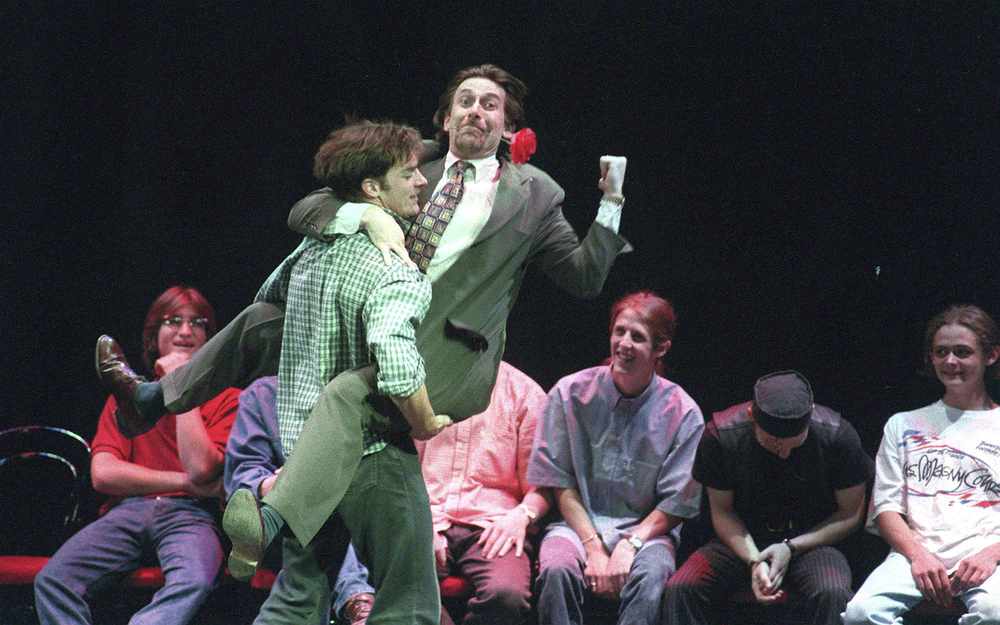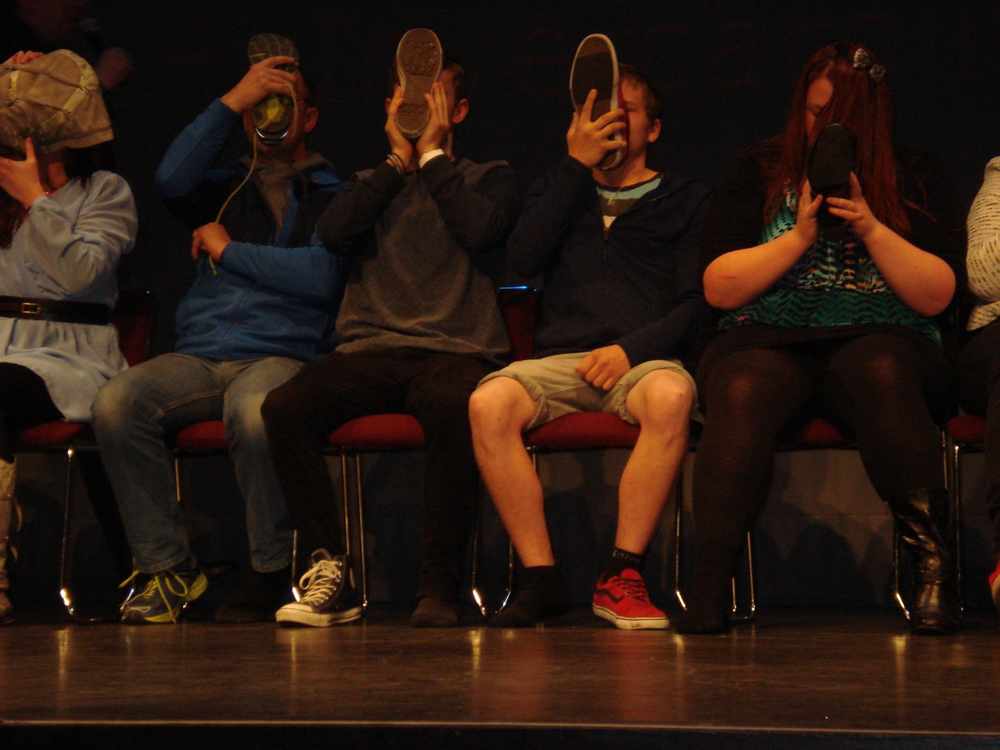‘THE World’s Most Experienced Hypnotist’, boasts the opening page of Andrew Newton’s website.
Hyperbole, you might think; however, a quick run-through of the Manchester-born entertainer’s three decade-plus career more than backs up the claim.
Having originally trained as a classical musician (he has played with the Royal Liverpool Philharmonic Orchestra, among others), Andrew took up hypnosis in the early 1980s and rapidly became one of the most successful in the business, performing to sell-out crowds across the country and providing the inspiration and training for a generation of like-minded performers, including one Paul McKenna (about whom more shortly).
And now Andrew is returning to Jersey for what will be his first live performance on the Island in more than a decade.
‘I last performed in Jersey 13 years ago,’ he says on the phone from his home in North Wales.
‘Back in the 1980s and early 90s, I was regularly doing summer seasons at the Lido de France for ten weeks at a time.
‘I must have done well over 300 shows in Jersey, and I’ve performed at virtually every single venue.’
- Andrew Newtons show The Hypnotist Live! is on at Fort Regent on Saturday 17 October at 8 pm.
- To book tickets, phone 449827.
Needless to say, then, Andrew is enthusiastic about returning to an Island that played such a lead role during his formative years.
‘I can’t give too much away about the show, otherwise people will go, “Oh-oh, I’m not getting up on stage and doing that”,’ he laughs.
‘The stuff I was doing back in the 80s was really quite tame compared to what I’m doing now.
‘It’s all got a lot closer to the line and it’s much faster paced. Better jokes, too!’
Even as he approaches his seventh decade, Andrew clearly remains as dedicated to his craft as ever.
‘Every hour on stage involves ten hours of preparation,’ he says, with considerable conviction.
‘It’s large shows such as Fort Regent that require the most skill and practice.
‘My mind will be focused all day and I’ll totally shut myself off from anyone for at least two hours before show time.
‘But it’s worth it.
‘It’s such a fantastic feeling being on stage in front of a big crowd, especially when you suddenly get these huge waves of laughter. It’s like a drug.’
Unfortunately, as with drugs, there’s an inevitable downside, as Andrew explains: ‘It gets your adrenalin pumping to the extent that you end up spending the entire night lying in bed staring at the ceiling.
‘Fortunately, I’ve now managed to train myself to calm down after a show, so within about half an hour of leaving the stage, I’ll be almost human again.
‘But back in the 1980s, I was just impossible to live with.’

He has another technique for alleviating his nerves, one which he often puts into practice before taking the stage: ‘I just remember what my father once told me.
‘If ever I was complaining about stress or pressure, he’d say: “You don’t know what you’re talking about, son.
‘You want to know pressure? Try having a Messerschmitt up your bum!”
‘He was a fighter pilot in the Second World War and he’d had Germans trying to shoot him out of the sky, which rather puts things in perspective.’
In stark contrast to his energetic stage performances, Andrew also works as a professional psychotherapist (‘No matter how much it hurts, I can make it go away’ promises his website).
‘As a rough outline, I’d say my psychotherapy consists of 90 per cent therapy and ten per cent hypnosis,’ he says.
‘I specialise in helping people who have deep-seated fears or phobias, who have maybe developed anxiety due to a traumatic experience.
‘I find that every case is very different, so I have to put all of my knowledge and experience to good use.’
Equally in contrast to the discipline and expert timing he maintains on stage, Andrew approaches each psychotherapy session with a relaxed, anything-goes attitude.
‘Sometimes a session will take an hour, sometimes it will go on all day,’ he says.
‘There is absolutely no fixed time.
‘But at the end of the day, they always go away happy.
‘If there is a root cause to their problems, I will find it.’
The process is, admits Andrew, helped somewhat by the picturesque surroundings in which the sessions take place.
‘I live at the heart of Conwy in North Wales, which is a beautiful little seaside town with a huge 13th-century castle dominating the landscape, so I’ll often take clients for a walk and a chat, rather than just sitting in my office with them.
‘But I want to deal with their problems there and then.
‘I don’t want them coming back next week or in a month’s time.
‘After all, what is there that I can say to them in a month’s time that I can’t just say to them today?
‘There’s no reason to stretch it out.’
Andrew’s commitment to helping people with ‘deep traumas’ means he has little truck with those who are looking to stop smoking or lose weight.
‘I’m very picky and choosy about who I take as a client,’ he says.
‘I want to help people who have serious long-term problems, not someone who just wants to quit smoking.
‘If you want to stop smoking, then stop smoking.
‘It’s not that difficult, folks. It’s really a lot easier than you think.
‘The same goes for people who want to lose weight.
‘Forget about all the different fad diets, because none of them work. They never, ever, ever work.
‘You’ll lose weight, then pile it back on again, then lose it again, and on and on.
‘But there’s actually a very simple long-term solution: eat less, exercise more.’
It’s worth pointing out that Andrew delivers the above preamble with far more tongue-in-cheek good humour than perhaps translates in print, as he does several unrepeatable comments regarding his former protégé Paul McKenna (let’s just say, I Can Make You Thin is unlikely to be at the top of Andrew’s reading list any time soon).
Indeed, as with his upbeat and snappy stage persona, Andrew is amusing and engaging throughout our conversation, practically shouting with enthusiasm when discussing the psychology work he carries out in universities and colleges overseas.
‘I do so much work abroad now,’ he says.
‘I spend half the year in Cape Town, where I have a house, and then Australia once a year as well.
‘India every February – what an incredible place!
‘A couple of years ago I got invited to lecture at the Indian Institute of Design and Technology.
‘Before I got there, I thought I’d be teaching a few kids in a room.
‘Instead, I arrive and there’s 2,000 people waiting in this hall to hear what I have to say.’
Andrew reserves particular admiration for what he describes as the ‘mind-blowing’ work ethic of Indian students.
‘There are 60 million Indians in university education, which is more than the population of Great Britain, and they’ve started to get really interested in psychology.
‘So I go over and talk about the sort of alternative therapies that are big over here.
‘Some of these kids are doing two degrees at the same time.
‘They’ll start studying at seven in the morning and they’re still studying at ten at night.’
Such is his boundless enthusiasm for India, it comes as a surprise when he names New Zealand as his favourite place to visit.
‘Well, I’m very well-known over there, so I go principally to massage my ego,’ he laughs.
‘I’m a big fish in a small pond. It is a stunning country, though.’
Indeed, even breaking his ankle during his last visit hasn’t dispelled Andrew’s affection for the country.
‘I wish I had a spectacular story to give you, like I broke it on stage or something, but no.
‘What happened was I was driving in my car and the light down the coast was just right, so I stopped the car and climbed onto this grassy bank to get a better view, but I missed my footing and fell.
‘I had to do the rest of the tour with my foot in a plaster.
‘But it was good in a way, because it got me sympathy from the audience.
‘Ladies and gentlemen, the show must go on…!’







